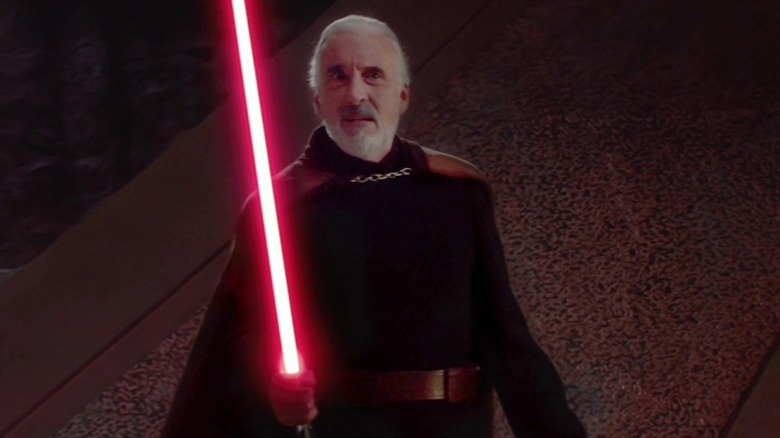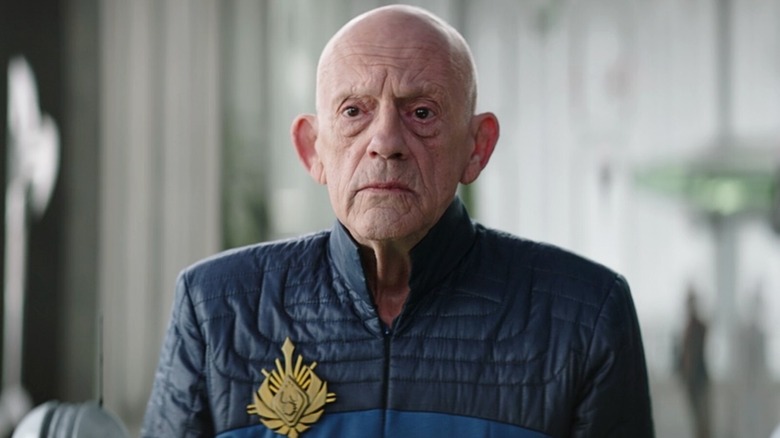Count Dooku Was Right About The Republic, And The Mandalorian Is Proving It
This article contains spoilers for "The Mandalorian."
Count Dooku doesn't get nearly enough credit as a "Star Wars" villain. He got sadly sandwiched between Darth Maul — with his striking visuals, his cool AF double-bladed lightsaber, and his menacing name — Grievous's cool robotic aesthetic that we sadly saw way too little of, and Anakin as a bad guy. Even though he is played by arguably the best-known of all the "Star Wars" villain actors (Christopher Lee), Count Dooku is often forgotten when talking about the best villains in the franchise.
And yet, he is arguably the most fascinating and tragic. Unlike the pure evilness of Maul or the blank expressions of Vader, Dooku is more of a gentleman and a scholar. He is also the first fallen Jedi we ever meet. Before Anakin turns to the dark side, we hear of Dooku's fall from grace. He was someone held in high esteem (unlike Anakin) by everyone in the council, who left the order disillusioned with the Jedi and the Republic, and who surfaced as a leader of a political insurrection, before unveiling himself as a Sith.
This is something the movies barely even hint at, but the shows have slowly but surely explored over the years — that Count Dooku had a good reason to leave the Jedi beyond "I want to be evil," and that he was a rather savvy politician.
We saw this in "The Clone Wars," we saw this in "Tales of the Jedi," and this week, we saw it with "The Mandalorian," where Dooku was directly name-dropped and his politics brought back to the conversation. And you know what? After the Empire, and knowing that the First Order is just around the corner, Dooku's ideas are sounding more and more enticing and correct.
He has a point
In the new episode, Bo-Katan and Din Djarin visit Plazir-15, a pompous utopia where Lizzo and Jack Black are in charge, nobles have lavish tea parties and play some sort of cricket-like game, and the general populace doesn't have to work or worry about anything anymore since all labor is left to droids.
The problem is that the droids are malfunctioning, and if they start attacking people (which seems likely given that they are repurposed battle droids from the war) they will have to be shut down, sending the planet into chaos.
It turns out, it was the planet's security officer, Commissioner Helgait (Christopher Lloyd) who caused the droids to malfunction, using nanobots made by the Techno Union hidden in droid lubricant they drank at a droid dive bar (it's a whole thing). His reasoning is ... well, it is not really explained very well. Helgait says he believes in democracy, but supposedly Plazir-15 just underwent their first democratic elections, so they already have that.
Regardless, he does name-drop Count Dooku during his little villain speech, calling him a visionary. Despite Helgait being misguided in this particular instance (sure, the rich seem over the top, but the people aren't working and have time for other stuff now, which is good!) he does raise one interesting point — Dooku was right, and the Republic did become evil. Worse yet, things are about to get worse in the galaxy far, far away.
Justice for Dooku
In "Attack of the Clones," Dooku briefly tries to get Obi-Wan on his side and ends up spilling the whole plot to him; Sidious being in charge, the end of the Jedi (kind of), everything. But of course, he doesn't listen.
Now, sure, Dooku's Separatist movement was all a farce by Palpatine, but that doesn't take away from the fact that the Republic was corrupt and decaying, and what replaced it was even worse. Even at the time of "The Mandalorian," we see how bureaucracy and a core worlds-centric government mess up things, and we see how it can eventually give rise to the First Order. All of this could have maybe been avoided if only more people listened to Dooku.
It seems the Mando-verse is leading up to a big Shadow of the Empire or Thrawn crossover event, but an episode like this — plus the deepening of Count Dooku's reasons for leaving the Jedi in "Tales of the Jedi" — makes me hope they bring back the idea of the Separatists at some point in the future. After the Empire and the First Order, who the hell wants yet another centralized government in that galaxy?


